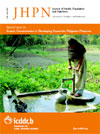
|
The Journal of Health, Population and Nutrition
icddr,b
ISSN: 1606-0997
EISSN: 1606-0997
Vol. 28, No. 1, 2010, pp. 23-33
|
 Bioline Code: hn10004
Bioline Code: hn10004
Full paper language: English
Document type: Research Article
Document available free of charge
|
|
|
The Journal of Health, Population and Nutrition, Vol. 28, No. 1, 2010, pp. 23-33
| en |
Use of Family Care Indicators and Their Relationship with Child Development in Bangladesh
Hamadani, Jena D.; Tofail, Fahmida; Hilaly, Afroza; Huda, Syed N.; Engle, Patrice & Grantham-McGregor, Sally M.
Abstract
Poor stimulation in the home is one of the main factors affecting the development of children living in
poverty. The family care indicators (FCIs) were developed to measure home stimulation in large populations
and were derived from the Home Observations for Measurement of the Environment (HOME). The
FCIs were piloted with 801 rural Bangladeshi mothers of children aged 18 months. Five subscales were
created: 'play activities' (PA), 'varieties of play materials' (VP), 'sources of play materials', 'household
books', and 'magazines and newspapers' (MN). All subscales had acceptable short-term reliability. Mental
and motor development of the children was assessed on the Bayley Scales of Infant Development and
their language expression and comprehension by mothers' report. After controlling for socioeconomic
variables, VP and PA independently predicted four and three of the developmental outcomes respectively,
and MN predicted both the Bayley scores. The FCI is promising as a survey-based indicator of the quality
of children's home environment.
Keywords
Care-giving behaviours; Child development; Cognitive development; Family care indicators; Home environment; Bangladesh
|
| |
© Copyright 2010 - International Centre For Diarrhoeal Disease Research, Bangladesh
Alternative site location: http://www.jhpn.net
|
|
